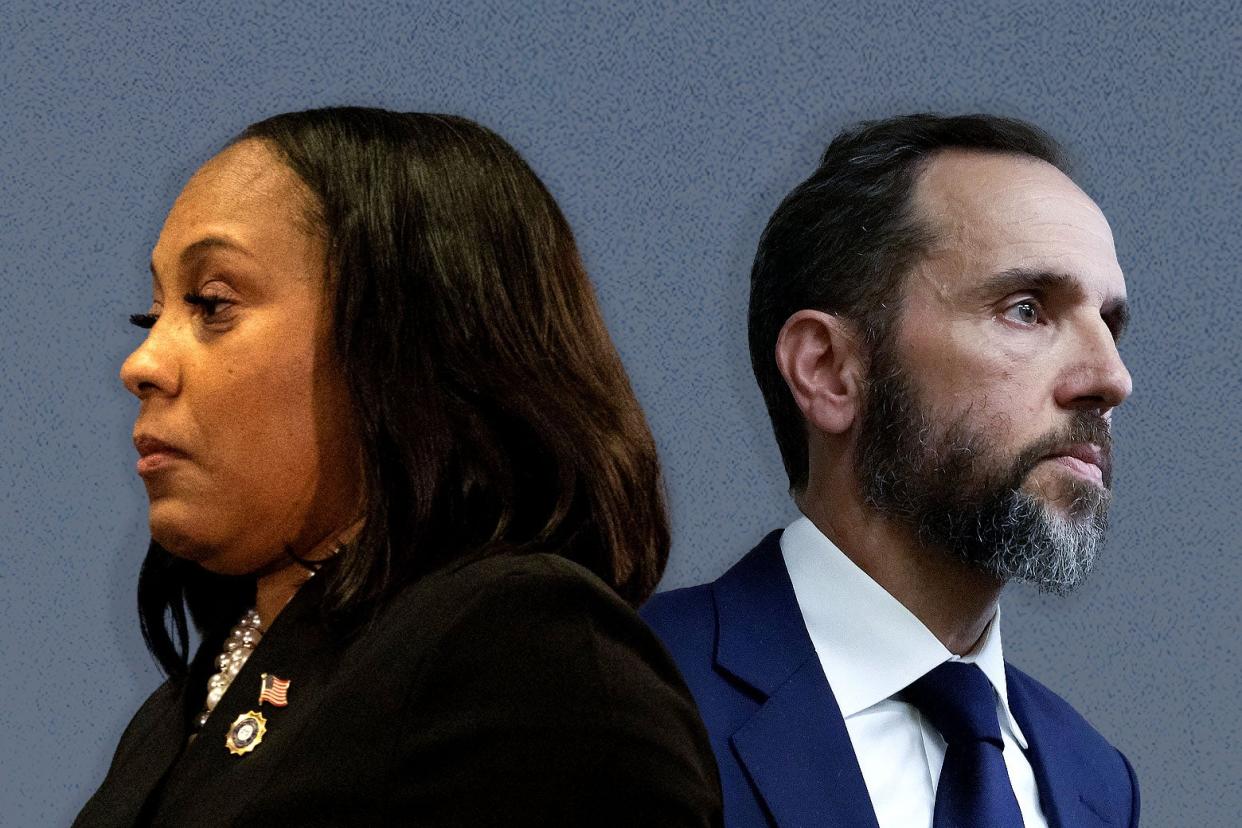Trump’s Last Two Indictments Complement Each Other Perfectly

- Oops!Something went wrong.Please try again later.
The two most recent indictments filed against Donald J. Trump are mirror images in many ways. Jack Smith’s federal document filed in Washington was spare almost to the point of being an inky line drawing, whereas Fani Willis’ Georgia filing is rich and detailed and pointillist. Smith targeted one defendant only, whereas Willis went after 19 defendants on 41 counts. Smith mentions a handful of co-conspirators; Willis notes 30 unindicted co-conspirators. As Norm Eisen and Amy Lee Copeland point out, Smith’s case will likely be blacked out for television and audio audiences, whereas Willis’ suit will most likely become must-see TV for weeks on end. Jennifer Rubin argues that the D.C. trial will happen quickly, while the Georgia case may face months of wrangling, flipping, bargaining with conspirators, and lengthy pretrial shenanigans. Claire Potter points out that Willis can seize Trump’s assets under Georgia’s RICO law. And Rick Hasen observes that Fani Willis has centered race and racialized vote suppression in a fashion that is far more explicit than the federal analogue.
Jack Smith as a literary character is tight-lipped and spare; Willis has been more voluble and open. And although Trump has been unsparing in his vitriol directed at both prosecutors, he has been at his racist, misogynistic worst with respect to Willis. That Smith did as little as was necessary to secure a clean conviction while Willis scooped up every text, threat, and goon from Pennsylvania to Arizona to Coffee County, Georgia, means that there will be a minimalist trial and a maximalist trial—a high-speed black-and-white missile and a slower, full-color IMAX version. Both renditions will pull in the same direction, and each will ensure that the 2024 election season plays out between Trumpian jaunts to and from the defendant’s table.
There’s one other notable contrast between the two stories that will be unspooled regarding the very similar events that took place after Donald Trump learned he’d lost the election and decided he would win it through organized crime. Smith chose to tell the story of an abstraction, crimes against democracy and the peaceful transfer of power. Willis is telling a concrete and detailed story of crimes against voters and election workers; Black voters in particular, female Black election workers in specific. In effect, Trump is on trial in D.C. for trying to break democracy and, in Fulton County, Georgia, for trying to set aside Black votes. The two stories are deeply connected, but they are also two very distinct acts of violence against elections. Smith reminds us what the country nearly lost, and Willis recalls what Black voters have almost never won.
Finally—and again, this is both atmospheric and also very important—Fani Willis has not just formally named Trump as a mobbed-up crime boss, but also placed him squarely behind the wheel of a national criminal clown car. For Trump, stripped away from the sober officials who once lent him intellectual heft and political credibility, his final public act may well be honking sadly on the oversize horn, surrounded by the likes of Rudy Giuliani, Sidney Powell, Jenna Ellis, and Jeff Clark. The only thing more piteous than the mental picture of a diminished Donald Trump in the dock standing trial for lies, forgeries, and bullying is Donald Trump doing so in the presence of a whole host of people—tragically, with law degrees—who are living case studies in moral and intellectual mediocrity. His co-defendants are living proof that the personnel equivalent of spray tan that briefly tried to burnish him into looking like a principled and sober commander in chief after 2016—John Bolton, John Kelly, Bill Barr, among others—had well and truly departed the scene by the time of the 2020 election assault.
To quote Hemingway, this legal process has played out slowly and then quickly. Still, it’s vitally important that what we’ve seen in the six-car pileup of litigation against Trump is happening at state and federal levels, in civil and criminal courthouses, and in televised and non-televised courtrooms, and that we will find ourselves spending the time between now and the 2024 election pretty much daily monitoring everything from Trump’s attempts to evade election finance regulations, defamation law, and the rules against being a magpie with national security documents, in addition to these two major trials around undermining free and fair elections. This matters because, in chief, this is what the rule of law looks like: trials, witnesses, testimony, evidence, judges, juries, and possibly convictions. It matters because, for all the big sillies who once said that impeachment and elections were not the appropriate forums in which to decide matters of justice, the buck stops now, at justice. And with all due respect to Lindsey Graham, it is not a good look when you narrowly evade being named as part of a criminal conspiracy that included making mobbed-up threats to election workers.
Donald Trump will no doubt add the newest Georgia indictment to his vast trophy case of whinings, grievances, and sacred sufferings. For some subset of his enthusiasts, it will serve as proof that he is the best, smartest, most long-suffering messianic figure in human history. But every time Trump tells an audience that he is facing these criminal sanctions for them, his listeners must wonder whether falsifying documents and lying to elected officials and threatening women in their kitchens is in fact a necessary component of their own civilian lives. Fani Willis adds her evidence against Trump to the heaving pile of stuff none of us ever actually does because only Tony Soprano does them. That lesson may never sink in for some die-hards, but it can indeed begin to look both petty and grimy. This case is important if not essential because, like its predecessors, it peels off yet another layer of spray tan to reveal the truth below.

